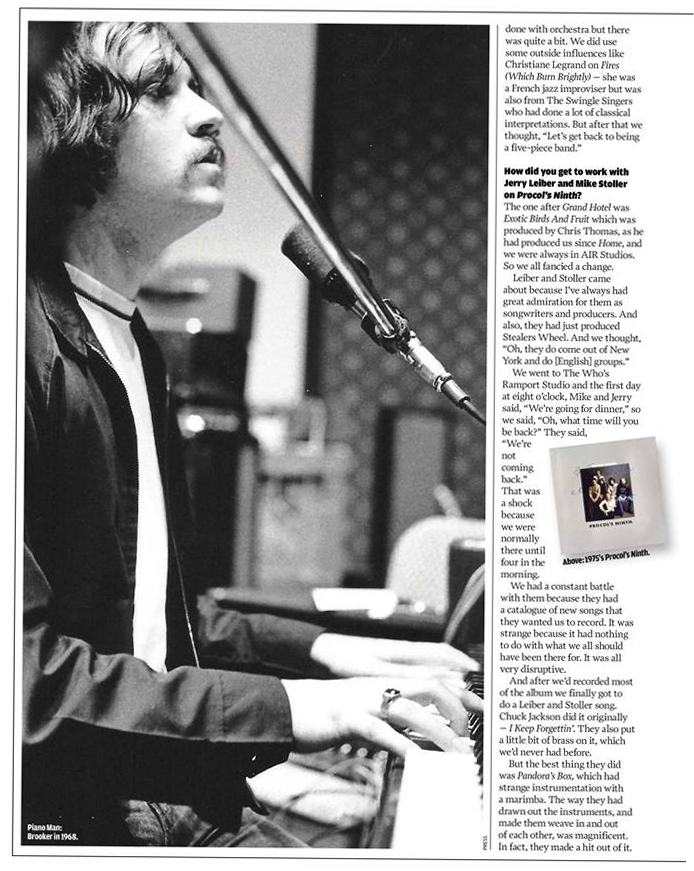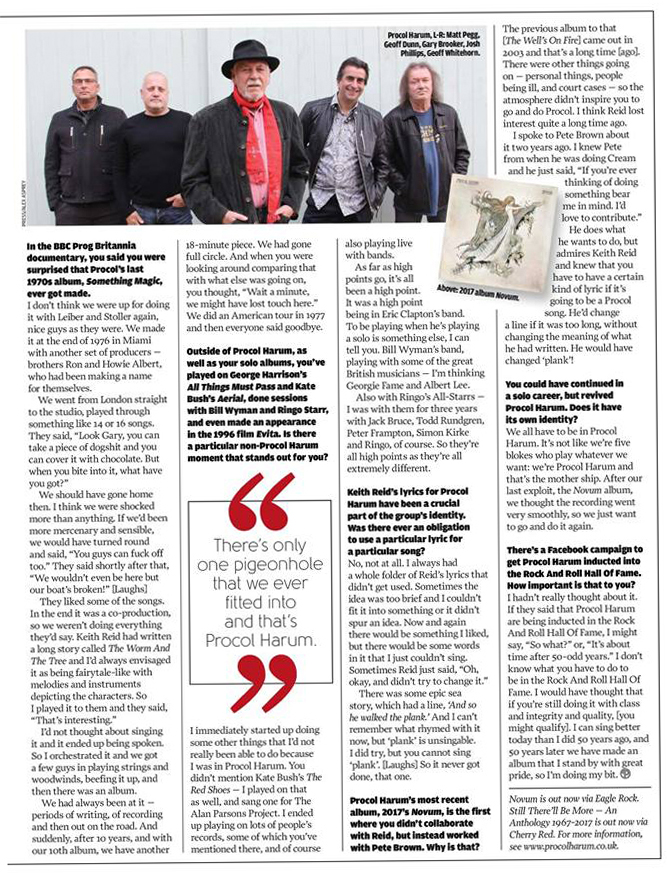With 1973’s Grand Hotel you carried on with an expansive sound…
I had a lot of song ideas in my head. Most of the Grand Hotel songs are quite split personality things that change mood. There are almost two songs in every song, like Robert’s Box.
We thought we’d have that big, lush sound. It wasn’t all done with orchestra but there was quite a bit. We did use some outside influences like Christiane Legrand on Fires (Which Burn Brightly) – she was a French jazz improviser but was also from The Swingle Singers who had done a lot of classical interpretations. But after that we thought, “Let’s get back to being a five-piece band.”
How did you get to work with Jerry Leiber and Mike Stoller on Procol’s Ninth?
 The
one after Grand Hotel was Exotic Birds And Fruit which was
produced by Chris Thomas, as he had produced us since Home, and we were
always in AIR Studios. So we all fancied a change. Leiber and Stoller came about
because I’ve always had great admiration for them as songwriters and producers.
And also, they had just produced Stealers Wheel. And we thought, “Oh, they do
come out of New York and do [English] groups.”
The
one after Grand Hotel was Exotic Birds And Fruit which was
produced by Chris Thomas, as he had produced us since Home, and we were
always in AIR Studios. So we all fancied a change. Leiber and Stoller came about
because I’ve always had great admiration for them as songwriters and producers.
And also, they had just produced Stealers Wheel. And we thought, “Oh, they do
come out of New York and do [English] groups.”
We went to The Who’s Ramport Studio and the first day at eight o’clock, Mike and Jerry said, “We’re going for dinner,” so we said, “Oh, what time will you be back?” They said, “We’re not coming back.” That was a shock because we were normally there until four in the morning.
We had a constant battle with them because they had a catalogue of new songs that they wanted us to record. It was strange because it had nothing to do with what we all should have been there for. It was all very disruptive.
And after we’d recorded most of the album we finally got to do a Leiber and Stoller song. Chuck Jackson did it originally – I Keep Forgettin’. They also put a little bit of brass on it, which we’d never had before.
But the best thing they did was Pandora’s Box, which had strange instrumentation with a marimba. The way they had drawn out the instruments, and made them weave in and out of each other, was magnificent. In fact, they made a hit out of it. Piano Man:
In the BBC Prog Britannia documentary, you said you were surprised that Procol’s last 1970s album, Something Magic, ever got made.
I don’t think we were up for doing it with Leiber and Stoller again, nice guys as they were. We made it at the end of 1976 in Miami with another set of producers – brothers Ron and Howie Albert, who had been making a name for themselves.
We went from London straight to the studio, played through something like 14 or 16 songs. They said, “Look Gary, you can take a piece of dogshit and you can cover it with chocolate. But when you bite into it, what have you got?”
We should have gone home then. I think we were shocked more than anything. If we’d been more mercenary and sensible, we would have turned round and said, “You guys can fuck off too.” They said shortly after that, “We wouldn’t even be here but our boat’s broken!” [Laughs]
They liked some of the songs. In the end it was a co-production, so we weren’t doing everything they’d say. Keith Reid had written a long story called The Worm And The Tree and I’d always envisaged it as being fairytale-like with melodies and instruments depicting the characters. So I played it to them and they said, “That’s interesting.”
I’d not thought about singing it and it ended up being spoken. So I orchestrated it and we got a few guys in playing strings and woodwinds, beefing it up, and then there was an album.
We had always been at it – periods of writing, of recording and then out on the road. And suddenly, after 10 years, and with our 10th album, we have another 18-minute piece. We had gone full circle. And when you were looking around comparing that with what else was going on, you thought, “Wait a minute, we might have lost touch here.” We did an American tour in 1977 and then everyone said goodbye.
 Outside of Procol Harum, as well as
your solo albums, you’ve played on George Harrison’s All Things Must Pass and
Kate Bush’s Aerial, done sessions with Bill Wyman and Ringo Starr, and even made
an appearance in the 1996 film Evita. Is there a particular non-Procol Harum
moment that stands out for you?
Outside of Procol Harum, as well as
your solo albums, you’ve played on George Harrison’s All Things Must Pass and
Kate Bush’s Aerial, done sessions with Bill Wyman and Ringo Starr, and even made
an appearance in the 1996 film Evita. Is there a particular non-Procol Harum
moment that stands out for you?
I immediately started up doing some other things that I’d not really been able to do because I was in Procol Harum. You didn’t mention Kate Bush’s The Red Shoes – I played on that as well, and sang one for The Alan Parsons Project. I ended up playing on lots of people’s records, some of which you’ve mentioned there, and of course also playing live with bands.
As far as high points go, it’s all been a high point. It was a high point being in Eric Clapton’s band. To be playing when he’s playing a solo is something else, I can tell you. Bill Wyman’s band, playing with some of the great British musicians – I’m thinking Georgie Fame and Albert Lee.
Also with Ringo’s All-Starrs – I was with them for three years with Jack Bruce, Todd Rundgren, Peter Frampton, Simon Kirke and Ringo, of course. So they’re all high points as they’re all extremely different.
Keith Reid’s lyrics for Procol Harum have been a crucial part of the group’s identity. Was there ever an obligation to use a particular lyric for a particular song?
No, not at all. I always had a whole folder of Reid’s lyrics that didn’t get used. Sometimes the idea was too brief and I couldn’t fit it into something or it didn’t spur an idea. Now and again there would be something I liked, but there would be some words in it that I just couldn’t sing. Sometimes Reid just said, “Oh, okay, and didn’t try to change it.”
There was some epic sea story, which had a line, ‘And so he walked the plank.’ And I can’t remember what rhymed with it now, but ‘plank’ is unsingable. I did try, but you cannot sing ‘plank’. [Laughs] So it never got done, that one.
Procol Harum’s most recent album, 2017’s Novum, is the first where you didn’t collaborate with Reid, but instead worked with Pete Brown. Why is that?
The previous album to that [The Well’s on Fire] came out in 2003 and that’s a long time [ago]. There were other things going on – personal things, people being ill, and court cases – so the atmosphere didn’t inspire you to go and do Procol. I think Reid lost interest quite a long time ago.
I spoke to Pete Brown about it two years ago. I knew Pete from when he was doing Cream and he just said, “If you’re ever thinking of doing something bear me in mind. I’d love to contribute.” He does what he wants to do, but admires Keith Reid and knew that you have to have a certain kind of lyric if it’s going to be a Procol song. He’d change a line if it was too long, without changing the meaning of what he had written. He would have changed ‘plank’!
You could have continued in a solo career, but revived Procol Harum. Does it have its own identity?
We all have to be in Procol Harum. It’s not like we’re five blokes who play whatever we want: we’re Procol Harum and that’s the mother ship. After our last exploit, the Novum album, we thought the recording went very smoothly, so we just want to go and do it again.
There’s a Facebook campaign to get Procol Harum inducted into the Rock And Roll Hall Of Fame. How important is that to you?
I
hadn’t really thought about it. If they said that Procol Harum are being
inducted in the Rock And Roll Hall of Fame, I might say, “So what?” or, “It’s
about time after fifty-odd years.” I don’t know what you have to do to be in the
Rock And Roll Hall Of Fame. I would have thought that if you’re still doing it
with class and integrity and quality, [you might qualify]. I can sing better
today than I did fifty years ago, and fifty years later we have made an album that I
stand by with great pride, so I’m doing my bit.
Novum is out now via Eagle Rock. Still There’ll Be More – An Anthology 1967-2017 is out now via Cherry Red. For more information, see [oddly!] www.procolharum.co.uk.